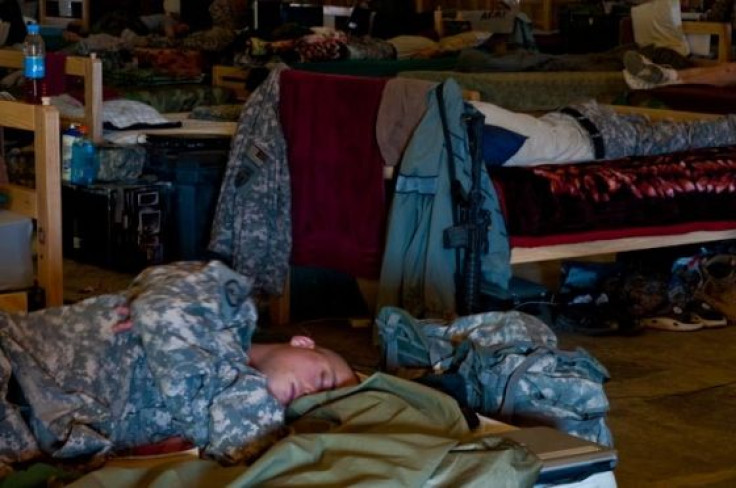Sleep Disorders Common In Military, American Society

Marines never leave a man behind, whether on the battlefield or -- as the joke goes -- at a nightclub. Marines also don't get much sleep, which is considered a form of weakness throughout the U.S. military.
While the Centers for Disease Control and Prevention in Atlanta advises most Americans to get seven to nine hours of sleep per a 24-hour period, military personnel say they take considerably less. More than 40 percent of service members say they get less than five hours of sleep, with a mean self-reported sleep duration of only 5.74 hours.
Researchers at Madigan Army Medical Center in Tacoma, Wash., expressed surprise at sleep loss even among combatants in war zones, U.S. Medicine, of Washington D.C., reported Wednesday.
"While sleep deprivation is part of the military culture, the high prevalence of short sleep duration in military personnel with sleep disorders was surprising," said Dr. Vincent Mysliwiec, an Army lieutenant colonel and lead author and chief of pulmonary, critical care and sleep medicine there. "The potential risk of increased accidents as well as long-term clinical consequences of both short-sleep duration and a sleep disorder in our population is unknown."
Publishing this research in September in the journal Sleep, researchers echoed concerns about sleep disorders and related troubles in the general population--and for a need to change attitudes about this pillar of health. The study found that 85.1 percent of study subjects experienced sleep disorders, with 51.2 percent experiencing sleep apnea. Just less than a quarter of patients in the military received diagnoses of insomnia. The researchers found sleep apnea rates roughly the same among military and civilian patients, though rates were much higher for insomnia (24.7 percent to 8.9 percent) and "behaviorally induced sleep syndrome (4.2 percent to 0.8 percent).
Investigators say the difference in results might partially be attributed to different methodologies between military and civilian sleep research centers, given that civilians might not have received evaluative polysomnograms. However, research on military members roughly matched results on North American police officers.
Lack of sleep came with a host of other ills, as researchers reported comorbidity with depression (22.6 percent), anxiety (16.8 percent), post-traumatic stress disorder (13.2 percent), mild traumatic brain injury (12.8 percent). Approximately half the patients in this study were taking pain medication, too. The investigators looked -- via "retrospective cross-sectional cohort analysis" -- at 725 diagnostic polysomnograms performed in 2010 on mostly men with combat experience.
To reach their conclusions, researchers employed a retrospective cross-sectional cohort analysis of 725 diagnostic polysomnograms performed in 2010 at Madigan Army Medical Center in Tacoma, Wash. Study subjects were active-duty military personnel from the Army, Air Force and Navy, overwhelmingly men (93.2 percent) with combat experience (85.2 percent).



























